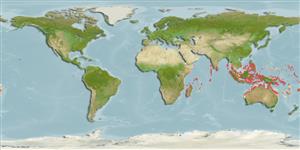Common names from other countries
>
Gobiiformes (Gobies) >
Gobiidae (Gobies) > Gobiinae
Etymology: Istigobius: Greek, istios = sail + Latin, gobius = gudgeon (Ref. 45335).
More on author: Smith.
Environment: milieu / climate zone / depth range / distribution range
Ecologia
marinhas; estuarina associadas(os) a recifes; intervalo de profundidade 1 - 12 m (Ref. 90102). Tropical; 15°N - 40°S
Indo-Pacific: Mozambique, Kenya, Sri Lanka, Papua New Guinea, Australia, and Micronesia; undoubtedly more widespread.
Tamanho / Peso / Idade
Maturity: Lm ? range ? - ? cm
Max length : 7.9 cm SL macho/indeterminado; (Ref. 1602)
Espinhos dorsais (total) : 7; Raios dorsais (total) : 10 - 11; Espinhos anais: 1; Raios anais : 9 - 10; Vértebras: 26. Pectoral fin rays entire. Predorsal cycloid scale 7-10, ctenoid on trunk. Few spots on nape; a dusky line running from eye dorsal to sensory pore path, ending at or before pectoral fin base; wavy brown lines on the snout. Pelvic and distal part of anal fins darker in males than in females. Appressed anal fin reaching within a distance of 1-2 scales of caudal fin in male, 2-4 scales in female; appressed 2nd dorsal slightly overlapping caudal in male. Some males exhibit 3-4 vertical bars on abdomen and 2-3 horizontal bars in 1st dorsal fin (Ref. 420); longitudinal scale series 30-32; no scales on cheek and opercle; body depth 4.9-6.1 in SL (Ref. 90102).
Occurs in turbid coastal areas near river mouths at less than 1 m to at least 12 m, Ref. 48637.
Ciclo de vida ou comportamento de acasalamento
Maturities | Reprodução | Spawnings | Egg(s) | Fecundities | Larvas
Genital papilla of male reaching anal spine. Female genital papilla truncate, ending well before origin of anal fin.
Murdy, E.O. and D.F. Hoese, 1985. Revision of the gobiid fish genus Istigobius. Indo-Pac. Fish. (4):41 p. (Ref. 420)
Status na Lista Vermelha da UICN (Ref. 130435)
CITES (Ref. 128078)
Not Evaluated
Ameaça para os humanos
Harmless
Uso pelos humanos
Ferramentas
Relatórios especiais
Baixar XML
Fontes da internet
Estimates based on models
Preferred temperature (Ref.
115969): 25.7 - 29.3, mean 28.6 (based on 2615 cells).
Índice de diversidade filogenética (Ref.
82804): PD
50 = 0.5010 [Uniqueness, from 0.5 = low to 2.0 = high].
Bayesian length-weight: a=0.01023 (0.00477 - 0.02194), b=3.02 (2.84 - 3.20), in cm Total Length, based on LWR estimates for this (Sub)family-body shape (Ref.
93245).
Nível Trófico (Ref.
69278): 3.3 ±0.4 se; based on size and trophs of closest relatives
Resiliência (Ref.
120179): Elevada, tempo mínimo de duplicação da população menor que 15 meses (Preliminary K or Fecundity.).
Fishing Vulnerability (Ref.
59153): Low vulnerability (10 of 100).
